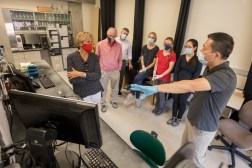Texas A&M researchers pit AI against secondary infections in COVID-19 patients

Students and researchers at Texas A&M University have begun using artificial intelligence to combat antibiotic-resistant bacteria that have infected a large number of COVID-19 patients, the university announced Tuesday.
According to researchers, adult patients who contracted and became severely ill with COVID-19 have, in some cases, also developed a secondary infection of bacterial pneumonia as a result of depleted lung function caused by the initial illness.
To develop new treatments to combat these secondary infections, a team of researchers in Texas A&M’s department of computer science and engineering are developing an AI model to identify effective antibiotics.
This project is part of a larger open challenge initiative called AI Cures, which aims to use AI tools to assist medical researchers in developing treatments for COVID-19 related illnesses.
“COVID-19 is one of the most contagious pandemics we’ve experienced and it has resulted in a great loss of human life,” Shuiwang Ji, team leader and associate professor in the computer science and engineering department, said in a press release. “Developing new drugs can be an effective way to control the virus, and researchers from all over the world have gotten involved to achieve this. … Our lab has accumulated many technologies to analyze the properties of molecules, which can be helpful to this project.”
Ji’s team is proposing the use of “advanced deep learning and machine learning methods for graph neural networks,” according to the release.




